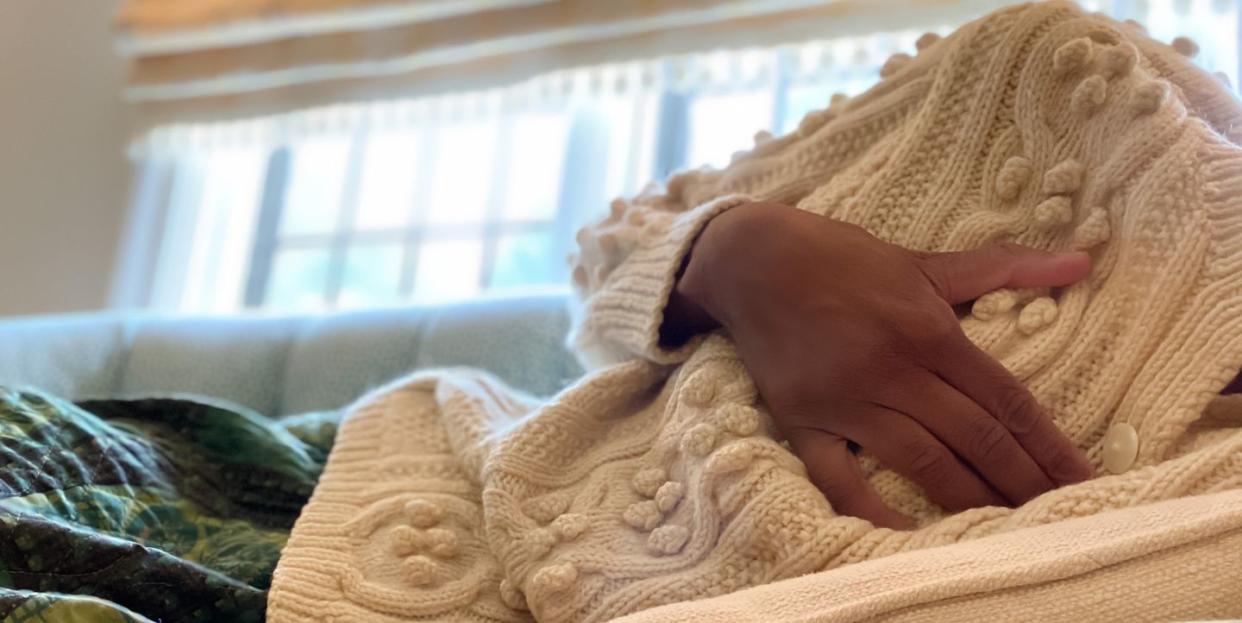Experts Say It’s Difficult for a Person to Tell If They’re Having Chest Pain From Anxiety or a Heart Attack

"Hearst Magazines and Yahoo may earn commission or revenue on some items through the links below."
People with anxiety will sometimes talk about having chest pains during a particularly stressful moment or panic attack. But, it’s only natural to wonder: Can anxiety cause chest pain? And how does that work, exactly?
For the record, yes, anxiety can cause chest pain. And, given that anxiety disorders impact 40 million adults in the U.S. each year, this is something that should be on a lot of people’s radar.
But why might anxiety cause chest pain and what does this feel like, exactly? Mental health experts break it all down, plus when to call for help.
Why can anxiety cause chest pain?
It has a lot to do with how your body responds to a perceived threat. Your autonomic nervous system (the part of your nervous system that controls involuntary actions, like your heartbeat) has several components, including your sympathetic nervous system, which triggers your fight-or-flight response, explains Thea Gallagher, Psy.D., clinical assistant professor of psychology at NYU Langone Health and co-host of the Mind in View podcast. “It’s your alarm system going off when you’re in a dangerous situation or what you perceive as a dangerous situation,” she says.
When this happens, your body releases a slew of different “excitatory” chemicals, including cortisol, adrenaline, epinephrine, and norepinephrine, Gallagher says, and that can make you feel hyped up and experience a slew of symptoms like shortness of breath, GI issues, and, yep, chest pain.
“The chest pain is a response to those excitatory chemicals,” Gallagher says. But, in the case of anxiety, you’re not typically facing a real physical threat. “We like to say that the alarm system is going off, but it’s because of burnt toast and not a fire,” Gallagher says.
What does anxiety-related chest pain feel like?
When you have anxiety-related chest pain, it’s a “full-body full body physiological response that can include a variety of symptoms,” says psychologist Alicia Clark, Psy.D., author of Hack Your Anxiety. You might experience the following when you have anxiety-related chest pain:
shortness of breath
muscle tightness
dizziness
sweating
racing heart
“Chest pain can result from many aspects of this experience including hyperventilation, tightening chest muscles, and even cardiac affects from the autonomic threat response caused by anxiety,” Clark says. “Chest pain can be different for everyone, but generally stays in the chest region and doesn’t radiate.”
How can you tell if you’re having chest pain from anxiety or a heart attack?
So…it’s tricky. And, because of that, you should “always seek medical attention,” says licensed clinical psychologist John Mayer, Ph.D., creator of the Anxiety’s a B!tch podcast. If you’ve had panic attacks in the past and you know what anxiety-related chest pain feels like for you, that’s a different story, Gallagher says. But, if you’re unsure, you really need to get to a hospital to get checked out, just to be safe.
There are a few differences you may notice, though. “Chest pain from an anxiety or panic attack most often develops when an individual is at rest, whereas heart attack pain most often develops when a person is active,” Mayer says. “Pain from a heart attack also frequently travels from the chest to other parts of the body, such as the jaw, shoulders, and arms. In contrast, chest pain stemming from anxiety remains in the chest.”
But, again, when in doubt, get it checked out. “If you don’t have a history of anxiety, or aren’t familiar with your personal anxiety symptoms, it is always wise to seek medical attention to make sure nothing more serious is occurring,” Clark says.
What to do if you’re having chest pain from anxiety
If you’re absolutely certain your chest pain is from anxiety, there are a few things you can do. A big one is to try to stay calm. “Anxiety-related chest pains are best calmed by lowering your threat response in genera,” Clark says. “Slowing and deepening your breathing can signal your autonomic nervous system you are safe and allow your body to return to normal functioning.”
Gallagher also suggests allowing yourself to “ride the wave” and not try to fight the anxiety or panic attack. “A lot of people will panic about the panic, but that will draw things out,” she says. “I encourage patients to remind themselves that this will not last forever.”
And, if you find that you’re regularly experiencing chest pains from anxiety, it’s important to seek help from a licensed mental health provider. They can help you pinpoint why you’re experiencing this, and help you with treatment to help minimize the odds it will happen again in the future.
You Might Also Like
